小学英语情景教学调查问卷
小学英语情景教学调查问卷

小学英语情境教学现状调查问卷(教师用)亲爱的老师:您好!为了比较全面地了解您对小学情境英语教学的理解及实施情况,恳请您填答以下的问题。
本问卷作为我硕士毕业论文的研究之用,您的宝贵意见对我的研究非常重要。
问卷无需署名,答案的选择对您无任何影响,不会对外透露您的任何信息,请您放心回答。
非常感谢!祝您工作顺利天天开心一、基本信息1、您所在学校的类型:(1)重点学校(2)非重点学校2、您所在学位的位置:(l)城市(2)城乡结合部(3)农村3、您目前任教的年级:(1)三年级(2)四年级(3)五年级(4)六年级4、您的学历层次:(1)大专及以下(2)本科(3)硕士研究生及以上(4)其他5、您的专业背景:(l)英语或英语教育专业(2)其他专业6、您的职称:(l)小学二级(2)小学一级(3)高级(4)其他7、您的年龄为:(l)20一25岁(2)36一30岁(3)31一35岁(4)36一40岁(5)40岁以上8、您的教龄为(1)l一5年(2)6一10年(3)11一15年(4)16一20年(5)20年以上9、您所在班级的班额是:(l)30人以下(2)30—45人(3)46一60人(4)60人以上10、您参与教研活动的频率是:(1)经常(2)偶尔(3)有就参加(4)不经常(5)从未11、您是否主动阅读一些关于教学理论和教学法方面的书籍或者刊物?(l)是(2)否12、您是否参加过有关“情境教学”的相关培训或学习?(l)是(2)否二、问卷调查(将适合的选项填在括号内)1、您了解英语情境教学吗?A、非常了解B、比较了解C、不太了解D、不知道2、您认为有必要进行英语情境教学吗?A很有必要B、比较需要C、一般D、没必要3、您在备课的时候会考虑通过创设一定情境来进行教学吗?一直很重视B、有时C、偶尔D、从来没有4、您在课堂中会精心创设各种丰富的教学情境吗?A、经常B、有时C、偶尔D、从来没有5.您认为现有教材提供的情境实用性怎样?A、非常好B、较满意C、一般D、还需要改进6、除了英语教材上的素材,您还会搜集其它一些资料作为情境创设的素材吗A、经常B、有时C、偶尔D、从来没有7、您分析过所用情境素材的教学价值吗?A、每次都有B、有时C、偶尔D、从来没有8、您会在课堂上讲述西方国家的风俗习惯、生活方式等相关文化吗?A、经常讲B、有时讲C、偶尔讲D、从来没有9、您在课堂中有机会给同学们展示一些课外原版的语言材料吗(如录像、录音等)?A、经常定期安排B、有时会安排C、偶尔安排D、从不安排10、您会在课余时带领学生将教室布置成充满英语学习氛围吗?A、经常B、有时C、偶尔D、从不11、在课堂中您利用教学挂图、实物、简笔画或自制教具来创设切合教学内容的课堂情境吗? 经常B、有时C、偶尔D、从不12、在课堂中您用多媒体设备、录音机、语音室、等现代化教学手段吗?A、经常B、有时C、偶尔D、从不13、课上您让孩子们听、唱英文歌曲或童谣吗?A、经常B、有时C、偶尔D、从不14、在教学中您会结合学生的学习情况创设生活情境吗?A、经常B、有时C、偶尔D、从不15、上课过程中您会经常利用肢体语言(如丰富的表情、做手势、做动作、唱歌、跳舞等)创设情境启发学生思考吗?A、经常B、有时C、偶尔D、从不16、在课堂中您会利用组织切合教学内容的游戏和小组竞赛的方式激励学生学习吗?A、经常B、有时C、偶尔D、从不17、在课上您会让学生模拟教材情境或自创生活情境分角色来扮演吗?A、经常B、有时C、偶尔D、从不18在布置作业时,您会布置学生预习下一课,并准备和下节课有关的实物资料(实物、图片、报纸等)吗?A、经常B、有时C、偶尔D、从不19、在布置作业时,您会布置学生分小组完成手抄报、表演对话或者编演小短剧吗?A、经常B、有时C、偶尔D、从不20、对于课堂上创设的各种教学情境,您认为学生感兴趣吗?A、很感兴趣B、较有兴趣C、兴趣一般D、一点也不感兴趣21、通过在课堂上创设一些教学情境,学生的求知欲增强了么?A、明显增强B、较有改善C、变化不大D、没有变化22通过在课堂上创设一些教学情境,学生的口语能力提高了么?A、明显提高B、较有改善C、变化不大D、没有变化23.在课堂中使用情境教学法时,学生的参与度如何?A、很高B、较高C、一般D、低24、日常教学中对学生口语进行测试的情况A、经常B、有时C、偶尔D、从不25、期中、期末考试中口语成绩所占比例A、每次有B、有时C、很少D、基本没26、在教学中对学生评价时利用各种激励性语言的情况(great、well done等)A、经常B、有时C、偶尔D、从不27、在课堂评价学生学习时,您充分利用丰富的肢体语言(如微笑、反复点头、露出赞赏的样子等)去评价学生吗?A、经常B、有时C、偶尔D、没意识28、在课堂教学中,您认为使用情境教学所获得的效果如何?A、很好B、较好C、一般D、不好29.影响你在听说教学中进行情境创设的主要因素是(多项选择)A、教学时间问题B、认为没有必要C、教学硬件不允许D、考试与情境关联不大E、其他30、您认为创设教学情境的难点是(多项选择):A、考试压力大B、学生的素质不均衡,两级分化严重,同一题材不一定符合所有学生的实际情况C、课程安排较紧,内容多,没有充足的时间D、要求教师要有扎实的专业知识、广泛的涉猎和较强的信息处理能力E、教师任务重,没精力做相关准备F、其他。
小学英语问卷调查表(1)
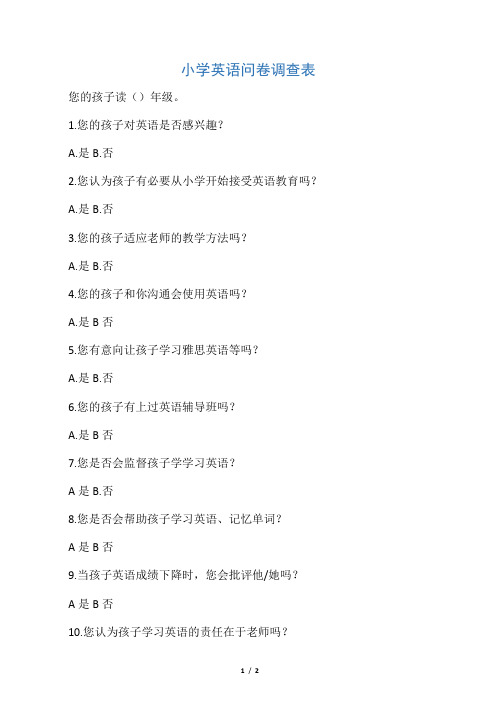
小学英语问卷调查表您的孩子读()年级。
1.您的孩子对英语是否感兴趣?
A.是
B.否
2.您认为孩子有必要从小学开始接受英语教育吗?
A.是
B.否
3.您的孩子适应老师的教学方法吗?
A.是
B.否
4.您的孩子和你沟通会使用英语吗?
A.是B否
5.您有意向让孩子学习雅思英语等吗?
A.是
B.否
6.您的孩子有上过英语辅导班吗?
A.是B否
7.您是否会监督孩子学学习英语?
A是B.否
8.您是否会帮助孩子学习英语、记忆单词?
A是B否
9.当孩子英语成绩下降时,您会批评他/她吗?
A是B否
10.您认为孩子学习英语的责任在于老师吗?
A是B否
11.您的孩子对自己的英语老师是否满意?
A是B否
12.您认为提高孩子的英语学习成绩的关键在于?(可多选)
A老师的教学B孩子自身的兴趣C学习量的多少
D先进的教学设备E良好的语言环境F孩子的学习态度
13.您对于老师的教学方法或者对于学校有什么意见或者建议? ________________________________________________________ 谢谢您配合我们的问卷调查活动。
小学英语情境教学问卷调查分析报告范文

小学英语情境教学问卷调查分析报告范文全文共6篇示例,供读者参考篇1My Report on the English Situational Teaching SurveyIntroductionHello, my name is Amy and I'm a student in Primary 5. Our English teacher, Miss Lee, recently conducted a survey about Situational Teaching in our English lessons. She wanted to find out what we students thought about learning English through different situations and activities. I'm going to share the results of the survey and my thoughts on it.The SurveyThe survey had 10 questions and all of us in Primary 4 to 6 had to answer it. The questions were about the different situations and activities Miss Lee uses to teach us English. Some examples are role-playing, games, singing songs, and watching videos. We had to rate how much we enjoyed each activity and if we felt it helped us learn English better.Survey ResultsHere are the main findings from the survey:Role-playing was the most popular activity, with 85% of students saying they really enjoyed it and found it very helpful for learning English.Games like bingo, charades and treasure hunts came a close second, with 80% of students giving them a thumbs up.Singing songs and watching videos were also quite popular, appreciated by around 70% of students.The least popular were reading dialogues from the textbook (only 30% liked it) and writing exercises (40% enjoyed them).An overwhelming 92% of students said they learned English better through situational activities compared to just reading from textbooks and doing worksheets.My Thoughts on the ResultsI definitely agree with the survey results! Role-playing is my absolute favorite way to learn English. It's really fun to pretend to be different characters and act out scenes. Like if we're learning about going to the supermarket, we get to role-play as shoppers and shopkeepers. This makes it so much easier to remember the new words and expressions.Games are great too because they make learning English an enjoyable challenge instead of hard work. For example, when we play English Bingo or Charades, we're practicing vocabulary and phrases without even realizing it. The competitiveness also motivates us to do better.Singing songs helps a lot with pronunciation and remembering lyrics is a cool way to learn new sentence structures. The videos are engaging and give real-life examples of how English conversations happen.I'm not a big fan of just reading dialogues because they can be quite boring after a while. The writing exercises are ok but quite hard, especially if we have to write a lot.So overall, I really enjoy the interactive and hands-on nature of situational teaching. It makes English lessons way more fun and interesting compared to just doing textbook work. I feel like I learn better this way too because the situations stick in my mind much more than just reading something.Room for ImprovementAlthough most of us love situational teaching, the survey showed that some students still find it a bit difficult or embarrassing at times. A few said they get nervous acting outroles in front of others. Some also requested more technology like learning English through apps and online games.So I think Miss Lee could look into having more pair/group activities instead of just whole-class ones. That might make the shy students feel more comfortable. Using more digital tools could make lessons even more engaging too.But on the whole, the positive response to the survey proves that situational teaching is a big hit! I really hope Miss Lee and our other English teachers continue using lots of fun activities, games and role-plays to make learning English an awesome experience.ConclusionTo sum up, this survey has shown that us primary school students overwhelmingly prefer learning English through situations and interactive activities rather than just textbooks and worksheets. Methods like role-playing, games, songs and videos seem to be the most effective and enjoyable ways to pick up the language.While there's still some room for improvement, situational teaching is clearly the way to go for making English lessons engaging and helping us become more confident andcompetent English speakers. Thanks for reading my report! I'm off to prepare for an English TV news reporting role-play now. Goodbye!篇2Here's a sample 2000-word report analyzing a survey on situational English teaching in primary schools, written from a primary student's perspective:Title: Fun Ways to Learn English at SchoolIntroductionHi there! My name is Emma, and I'm a student in Year 5. Our teacher, Miss Wong, recently gave us a survey about how we like to learn English in class. She wanted to find out what kinds of activities we enjoy the most and which ones help us understand better. After we all filled out the survey, she shared the results with us. It was really interesting to see what my classmates thought! Here's what we found out:Survey ResultsMost of us said that we like it when English lessons are fun and interactive. The activities we enjoyed the most were:Role-playing/Acting out dialogues and stories (87%)Singing songs and chanting rhymes/raps (84%)Watching short video clips or movies (81%)Playing educational games (79%)A lot of us also said that we find it easier to learn new words and grammar when we can connect them to real-life situations. For example, over 70% of us felt that using props, realia (real objects), and pictures/flashcards helped us remember vocabulary better.On the other hand, some of the activities we didn't find as engaging were just reading from our textbooks (23% enjoyed this), doing written exercises from worksheets (31%), and listening to the teacher explain grammar rules (39%).AnalysisFrom the survey, it's clear that us kids really respond well to active, hands-on learning. When we get to do role-plays, sing songs, watch videos etc., it makes the lessons much more fun and memorable. I think it's because we're using English in a realistic way, just like how we'd use it in the real world. Instead of just reading about how to order food at a restaurant, we can actually act it out. That makes it easier for the language to stick in our minds.The use of props, pictures and real objects also seems to help a lot of us. I guess it's because we're visual learners, and having something concrete to look at helps connect the words to their meanings. Just reading vocabulary lists can be boring, but if we can see and touch the objects, it makes more sense.While we don't dislike reading, writing, and analyzing grammar completely, most of us find those solo activities a bit dry if that's all we're doing. From the results, it looks like we learn best when we can experience English through multi-sensory methods – speaking, listening, moving around, etc. That's probably why games, role-plays and songs ranked so highly.RecommendationsBased on the survey results, I think there are a few ways our teachers could make English lessons even more engaging:Have more conversational practice through role-plays, games and group activities. We could set up class "restaurants", "shops" etc. and take turns being customers and servers.Use more audio-visual materials like short video clips, songs/rhymes, and flashcard games. The songs seem to really help us remember vocab and grammar.Go on field trips or bring in guest speakers sometimes. It would be cool to practice our English with native speakers or in real-life environments like restaurants.Use more hands-on props and realia, especially for new vocabulary topics. Let us touch and play with the objects while learning the words.For grammar study, try to make it more interactive with games, dialogues and role-plays instead of just lecturing rules.Overall, the survey showed that when English is taught through engaging, multi-sensory activities, it really helps us learn better and have more fun!ConclusionWell, that's my report on our class survey results! I hope our teachers find the feedback useful. At the end of the day, we're just kids - and kids learn best when lessons are interactive, hands-on and enjoyable. With some fun new additions to our English programme, I'm sure we'll make great progress. Let me know if you have any other questions!篇3Situational English Teaching in Primary Schools: A Student's PerspectiveIntroductionLearning English as a second language can be a daunting task for many primary school students, especially when it comes to understanding and applying the language in real-life situations. Traditional teaching methods often focus on rote memorization of grammar rules and vocabulary, which can be dry and demotivating for young learners. Fortunately, many schools have embraced a more innovative approach called "situational English teaching," which aims to create immersive and engaging environments for students to practice English in contexts that mimic real-life scenarios.As a primary school student who has experienced both traditional and situational English teaching methods, I would like to share my insights and perspectives on this approach. In this report, I will explore the benefits and challenges of situational English teaching, as well as provide recommendations for further improvement.Benefits of Situational English TeachingIncreased Engagement and MotivationOne of the most significant advantages of situational English teaching is its篇4My Big Report on How We Learn English at SchoolIntroductionHi there! My name is Amy and I'm a 5th grader at Sunnydale Elementary. Our school has been trying out some new ways of teaching us English and they asked me and my classmates to let them know what we think by filling out a survey. Well, I really had a lot to say! English is one of my favorite subjects but learning it can be pretty confusing and frustrating sometimes. I decided to put together this big report to share my thoughts and the results from the survey.The Old Way of Learning EnglishUp until last year, we learned English pretty much just by listening to our teacher explain grammar rules and doing worksheets or activities from our textbooks. I have to admit, it was kind of boring! Just sitting at our desks going through the books page by page. We did get chances to practice speaking English with our classmates sometimes, but it always felt reallyawkward and unnatural. Like we were just reciting from a script instead of actually using the language to communicate.About half the kids in my class, including me, come from homes where our parents don't really speak much English. So we didn't get a whole lot of English practice outside of school either. By the time I got to 4th grade, even though we had been studying English for years, I still didn't feel very confident using it.I could get decent grades on tests about vocabulary and grammar, but I had a really hard time understanding English movies or books, or just basic conversations.The New Situational Teaching MethodThat's when our school decided to try this new "situational" method for teaching English. Instead of just lectures and textbook exercises, our teachers started creating more realistic scenarios and activities to get us practicing English in a more natural way.For example, one week our classroom was turned into a little restaurant. Some kids were the servers, some were the cooks, some were the customers. We had to use English to take orders, call out the food from the kitchen, pay the bill, and interact just like you would at a real restaurant. Another time, we had a little store set up and half the class were the shopkeepers sellingdifferent items while the other students were the customers coming in to shop, make purchases, and have English conversations.We even went on some field trips around town and had to use our English to ask directions, make requests at places like cafes or shops, and discuss what we were seeing and doing. One of my favorite activities was putting on a short play entirely in English for our parents and the other classes at school.What We Thought About Situational TeachingOur teachers had us all fill out a survey to get our feedback on this new situational approach compared to how we learned English before. I thought the survey questions were really on point and managed to cover all the key things I wanted to give my opinion on.First, we were asked whether the new teaching method helped improve our overall English ability like speaking, listening, writing etc. An overwhelming 87% of students, including me, said we felt our English got much better across all areas compared to just doing textbook work. Putting the language into real practice and not just doing grammar drills made such a big difference!We were also asked if the new method was more enjoyable and engaging than our previous English classes. A massive 94% of us said it was way more fun and interesting! Speaking for myself, I actually looked forward to English class and didn't dread it like I used to. The activities were exciting, kept us on our toes, and made learning English feel like a fun challenge rather than a boring chore.Another key question was whether the new situational method made us feel more motivated and confident to use English, even outside of class. 79% of us, myself included, said we did feel way more motivated to practice and confident trying to use English in the real world after doing all those realistic practice activities at school. I know I personally started feeling way less shy about trying to strike up English conversations when I was out and about.The survey also asked about whether we felt the situational teaching was more effective at preparing us for tests, speaking with foreigners, watching English movies, reading English books etc. An impressive 92% of students agreed it gave us way better real-world skills that transfer over to all those English language domains compared to just textbook learning. I know I went from struggling to follow even simple English videos to now beingable to comprehend most stuff for kids my age without too much trouble.Concluding ThoughtsTo wrap up my report, I want to say that overall, our class massively prefers and benefits way more from this new situational way of learning English. Getting immersed in real篇5Here's a 2000-word sample analysis report written from a primary school student's perspective on the topic of "Situational English Language Teaching Survey and Analysis Report":Situational English Language Teaching Survey and Analysis ReportIntroductionEnglish is one of the most important languages in the world. It's spoken by people from different countries and cultures, and it's really helpful for communicating with others. In our school, we learn English through situational teaching methods, which means our teachers try to create real-life situations in the classroom to help us understand and use English better.Our class recently conducted a survey to find out how effective these situational teaching methods are in helping us learn English. We wanted to know what kinds of activities and techniques our classmates find most helpful, and what areas could be improved. In this report, I'll share the results of our survey and provide an analysis of what we've learned.Survey MethodologyWe created a simple questionnaire with ten questions about our experiences with situational English language teaching. The questions covered topics like:Types of situational activities we do in class (role-playing, games, etc.)How helpful we find these activities for learning vocabulary, grammar, and conversation skillsWhether we feel more confident speaking English after participating in situational activitiesWhat we like or dislike about situational teaching methodsSuggestions for improving or adding new situational activitiesWe handed out the questionnaires to all 30 students in our class, and 28 of them completed and returned the survey.Survey ResultsHere are some of the key findings from our survey:The most popular situational activities were role-playing scenarios (89% of students found them helpful), vocabulary games (86%), and conversation simulations (82%).Students felt that situational activities were most effective for improving their speaking skills (93% said they helped "a lot" or "somewhat") and vocabulary acquisition (86%).However, only 68% of students felt that situational activities helped them improve their grammar skills, which was the lowest rating among the language areas we asked about.Overall, 82% of students said they felt more confident speaking English after participating in situational activities.The things students liked most about situational teaching were that it made learning fun (96%), helped them practice real-life conversations (89%), and made it easier to remember new words and phrases (86%).Some of the dislikes or areas for improvement included: not having enough opportunities to practice (21%), feeling shy or nervous in front of classmates (18%), and finding some activities too difficult or confusing (11%).Analysis and RecommendationsBased on the survey results, it's clear that situational teaching methods are generally well-received and effective for helping us learn English, particularly when it comes to improving our speaking skills and vocabulary. The interactive and real-life nature of these activities makes learning more engaging and memorable, which is reflected in the high ratings for boosting confidence and making learning fun.However, the results also suggest that there's room for improvement, especially when it comes to teaching grammar concepts through situational methods. While role-playing and conversation simulations are great for practicing fluency and vocabulary, they may not provide enough explicit instruction or structured practice for mastering complex grammar rules.To address this, our teachers could consider incorporating more grammar-focused activities or mini-lessons within situational scenarios. For example, they could highlight specific grammar points during role-plays and provide feedback andcorrections. They could also create situational games or tasks that require us to use particular grammar structures accurately.Another area for improvement is providing more opportunities for individual practice and ensuring that activities are appropriately challenging without being too difficult or confusing. Some students felt shy or nervous performing in front of classmates, so teachers could consider breaking us into smaller groups or pairs more often, or providing low-stakes opportunities to practice before presenting to the whole class.Overall, though, the survey results indicate that situational teaching methods are an effective and popular way to learn English in our class. By continuing to use these interactive and engaging activities, while also addressing areas for improvement like grammar instruction and individual practice opportunities, our teachers can help us become even more confident and proficient English speakers.ConclusionLearning a new language can be challenging, but situational teaching methods make the process more fun and relatable. Through this survey, we've gained valuable insights into what works well and what could be improved in our situational English lessons.By incorporating more grammar-focused activities, providing more individual practice opportunities, and ensuring that activities are appropriately challenging, our teachers can continue to enhance our learning experience and help us become even better English communicators.I'm grateful to have had the opportunity to conduct this survey and share our findings. It's been a great learning experience for me, and I hope our recommendations will be helpful in shaping the future of situational English teaching in our class and school.篇6A Big Look at How We Learn English in Fun WaysIntroductionHi everyone! My name is Emma and I'm a 5th grader at Oakwood Elementary School. For our class project this year, we did a big survey about how we learn English through fun activities and real-life situations instead of just from textbooks. Our teacher says this is called "situational" or "contextual" learning. We asked other students, teachers, and even some parents about what they think are the best ways to practice English in a natural way. Here's what we found out!Survey MethodsFirst, we made a survey with 10 questions to ask people's opinions on things like role-playing, games, show&tell, field trips, and other interactive English activities. We asked multiple choice, rating scale, and open-ended questions. For example:"How much did you enjoy the restaurant role-play activity?"(Rating scale from 1-5 smiling faces)"What was your favorite kind of situational learning activity and why?"(Open-ended response)We had 125 student surveyors who went around during lunch, recess, and after school to get responses from:375 students (from grades 1-5)32 teachers67 parentsWe put everything into a spreadsheet to analyze the data. It took a while but it was cool to see all the numbers and figures!Key FindingsAlmost everyone agreed that contextual, engaging activities are much more fun than just doing bookwork and drills. They make learning English feel realistic and useful, not just lessons. The top 3 favorite activities were:Field trips & community interactions (like restaurantrole-plays)Show&tell presentationsGames (board/card games, online games, etc.)Tied for 4th were drama/role-playing and creative projects like poster making. Least favorite was just having conversations without a clear context. Here's a breakdown of how much students said they enjoyed each activity type:Field trips/community visits: 89% loved itShow&tell: 81% loved itGames: 77% loved itDrama/role-play: 69% loved itCreative projects: 69% loved itOpen conversations: 43% loved itI put together some graphs that really show how much we all liked the contextual stuff. Check them out below! There are pie charts for overall feelings and bar graphs comparing how students, teachers, and parents rated each activity.In the comments, people explained why contextual learning is awesome. A few examples:"I loved the restaurant activity because it felt like actually ordering food, not just saying phrases from a book.""Field trips make the English so much more meaningful when you can use it right then and there.""The creativity in games and projects sparks way more interest than just memorizing.""It's so powerful for students to present and get thatreal-world practice in a supportive way."Some suggested even more ideas like job shadowing, mock debates, simulated business meetings, and culturalactivities/festivals.ConclusionOverall, the survey results proved that contextual, engaging, and interactive methods are a huge hit for learning English.Getting out of the classroom, roleplaying, creating projects, and any activities that feel relevant and lifelike make students way more motivated and interested. The feedback showed we crave authentic opportunities to use English in a natural way, not just from a textbook.I hope teachers keep using these awesome hands-on techniques. Situational learning makes English feel so much more alive and useful. It's the best way for kids like me to build confidence and skills we'll actually use when communicating and being global citizens. English opens up so many doors, so we've got to practice it in realistic situations that show its real power. That's the key takeaway from our school community's big survey! Let's get situational!。
小学英语教学的调查问卷

小学英语教学的调查问卷篇一:小学生英语课堂现状调查问卷小学生英语课堂现状调查问卷饶章青实行新课程改革以后,教师们的教育理念发生很大的变化,课堂教学逐渐由教师的教转变为学生的学,课堂气氛越来越活跃,教学效果也有了明显的改善。
但是,我们也应该看到,由于传统教育教学观念的影响,教师们在课堂教学实践中还有很多教学细节不符合新课程理念,需要在以后的实践中努力加以改进。
使学生获得认识世界的整体视野,关注新颖而变化的时代、丰富而多彩的社会、真实而复杂的生活,在生活中应用英语知识,从而真正认识到学习的意义和价值。
为做好课题研究,我们对班级学生进行了调查问卷。
调查对象:小学四、六年级部分学生调查内容:1、你认为英语课是:A、有趣的B、枯燥的C、令人兴奋的D、一般,无所谓2、你英语课堂上最喜欢哪种学习方法?A、听讲B、对话C、操练D、游戏3、当你在英语课堂上没有掌握住所学知识时,你会怎样做?A、自己听录音解决B、问同学C、问老师D、问家长4、你的英语老师提问主要针对:A、大部分同学B、部分优等生C、部分后进生5、你认为英语老师教学时,哪一种方法你听课专注些?A、灌输式教学法B、多媒体教学C、游戏化教学D、情景化教学6、你在英语课堂上参与学习的情况?A、积极主动地学习B、较少主动答问,提问或参与讨论7、英语课堂上,你有注意力不集中或做别的功课的习惯吗?A、经常有B、偶尔有C、从来没有8、你认为现在的英语课堂:A、融洽、活跃而有序B、有时感兴趣C、没有兴趣9、你觉得英语重要吗?()A、重要B、不重要C、一般般,无所谓10、家长有经常跟你说小学英语的重要性吗?()A、有B、没有C、偶尔有调查结果统计:1、你认为英语课是:A、有趣的20%B、枯燥的37%C、令人兴奋的10%D、一般,无所谓33%2、你英语课堂上最喜欢哪种学习方法?A、听讲10%B、对话0%C、操练10%D、游戏80%3、当你在英语课堂上没有掌握住所学知识时,你会怎样做?A、自己听录音解决4%B、问同学28%C、问老师58%D、问家长10%4、你的英语老师提问主要针对:A、大部分同学60%B、部分优等生30%C、部分后进生10%5、你认为英语老师教学时,哪一种方法你听课专注些?A、灌输式教学法2%B、多媒体教学23%C、游戏化教学70%D、情景化教学5%6、你在英语课堂上参与学习的情况?A、积极主动地学习40%B、较少主动答问,提问或参与讨论60%7、英语课堂上,你有注意力不集中或做别的功课的习惯吗?A、经常有10%B、偶尔有30%C、从来没有60%8、你认为现在的英语课堂:A、融洽、活跃而有序16%B、有时感兴趣69%C、没有兴趣15%9、你觉得英语重要吗?()A、重要85%B、不重要5%C、一般般,无所谓10%10、家长有经常跟你说小学英语的重要性吗?()A、有30%B、没有30%C、偶尔有40%调查结果分析:从调查结果看来,学生对英语课感兴趣或令人兴奋的加起来仅有34%,认为自己主动参与课堂的也仅仅占到65%,认为英语课没有一点兴趣的也占到了10%。
小学英语课堂教学情境创设的策略研究问卷调查表
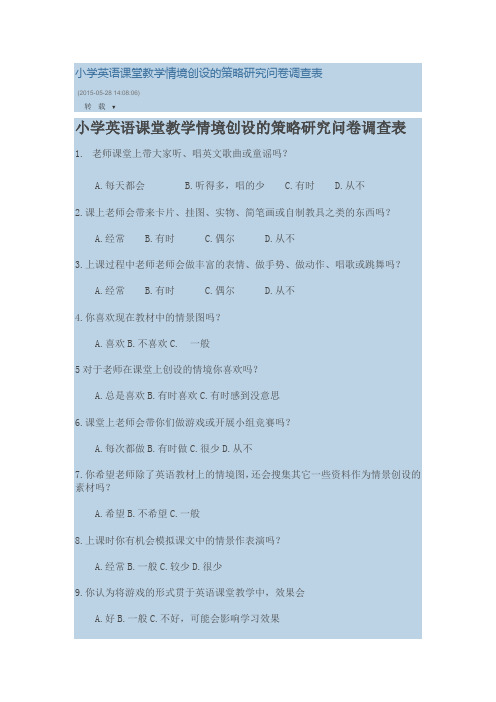
小学英语课堂教学情境创设的策略研究问卷调查表
(2015-05-28 14:08:06)
转载▼
小学英语课堂教学情境创设的策略研究问卷调查表
1.老师课堂上带大家听、唱英文歌曲或童谣吗?
A.每天都会
B.听得多,唱的少
C.有时
D.从不
2.课上老师会带来卡片、挂图、实物、简笔画或自制教具之类的东西吗?
A.经常
B.有时
C.偶尔
D.从不
3.上课过程中老师老师会做丰富的表情、做手势、做动作、唱歌或跳舞吗?
A.经常
B.有时
C.偶尔
D.从不
4.你喜欢现在教材中的情景图吗?
A.喜欢
B.不喜欢
C. 一般
5对于老师在课堂上创设的情境你喜欢吗?
A.总是喜欢
B.有时喜欢
C.有时感到没意思
6.课堂上老师会带你们做游戏或开展小组竞赛吗?
A.每次都做
B.有时做
C.很少
D.从不
7.你希望老师除了英语教材上的情境图,还会搜集其它一些资料作为情景创设的素材吗?
A.希望
B.不希望
C.一般
8.上课时你有机会模拟课文中的情景作表演吗?
A.经常
B.一般
C.较少
D.很少
9.你认为将游戏的形式贯于英语课堂教学中,效果会
A.好
B.一般
C.不好,可能会影响学习效果
10.你喜欢那些英语课堂活动?(多选)
A.老实讲,学生听,做好笔记
B.较色扮演
C.回答问题
D.做游戏。
小学英语调查问卷模板
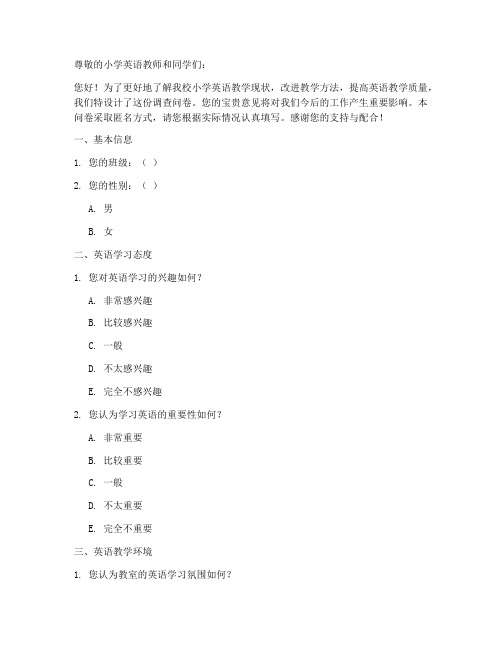
尊敬的小学英语教师和同学们:您好!为了更好地了解我校小学英语教学现状,改进教学方法,提高英语教学质量,我们特设计了这份调查问卷。
您的宝贵意见将对我们今后的工作产生重要影响。
本问卷采取匿名方式,请您根据实际情况认真填写。
感谢您的支持与配合!一、基本信息1. 您的班级:()2. 您的性别:()A. 男B. 女二、英语学习态度1. 您对英语学习的兴趣如何?A. 非常感兴趣B. 比较感兴趣C. 一般D. 不太感兴趣E. 完全不感兴趣2. 您认为学习英语的重要性如何?A. 非常重要B. 比较重要C. 一般D. 不太重要E. 完全不重要三、英语教学环境1. 您认为教室的英语学习氛围如何?A. 非常好B. 比较好C. 一般D. 不太好E. 完全不好2. 您认为学校的英语教学设施是否完善?A. 非常完善B. 比较完善C. 一般D. 不太完善E. 完全不完善四、英语教学方法1. 您认为教师的教学方法是否适合您的学习习惯?A. 非常适合B. 比较适合C. 一般D. 不太适合E. 完全不适合2. 您认为以下哪些教学方法在英语教学中比较有效?A. 多媒体教学B. 小组合作学习C. 角色扮演D. 听力训练E. 阅读训练F. 口语训练G. 以上都是H. 以上都不是五、英语学习困难1. 您在英语学习中遇到的主要困难是什么?A. 词汇量不足B. 语法知识掌握不牢固C. 听力理解困难D. 口语表达能力差E. 写作能力不足F. 其他(请说明)2. 您认为哪些因素影响了您的英语学习效果?A. 家庭教育B. 学校教学C. 个人兴趣D. 社会环境E. 以上都是F. 以上都不是六、建议与期望1. 您对英语教学有哪些意见和建议?(请在此处填写)2. 您对今后的英语学习有哪些期望?(请在此处填写)再次感谢您参与本次调查问卷,您的宝贵意见将对我们今后的工作产生重要影响。
祝您学习进步,生活愉快!此致敬礼![学校名称][调查问卷设计者姓名][设计日期]。
小学教育英语调查问卷模板

尊敬的家长/教师:您好!为了更好地了解我国小学英语教育的现状,改进教学方法,提高英语教学质量,我们特开展此次调查。
本问卷采取匿名方式,所有信息仅用于统计分析,请您放心填写。
感谢您的支持与配合!一、基本信息1. 您的孩子目前就读于几年级?()A. 一年级()B. 二年级()C. 三年级()D. 四年级()E. 五年级()F. 六年级2. 您的孩子每周英语课时数是多少?()A. 1节()B. 2节()C. 3节()D. 4节及以上3. 您认为孩子的英语学习兴趣如何?()A. 非常浓厚()B. 较浓厚()C. 一般()D. 不太浓厚()E. 完全没有二、英语教学环境4. 您的孩子所在的学校是否配备英语专用教室?()A. 是()B. 否5. 您的孩子所在的学校是否配备英语教学设施(如多媒体设备、实物教具等)?()A. 是()B. 否6. 您认为学校英语教学环境的创设对提高学生学习兴趣有何影响?()A. 非常大()B. 较大()C. 一般()D. 较小()E. 没有影响三、英语教师教学7. 您的孩子所在的英语教师是否具备专业资质?()A. 是()B. 否8. 您认为英语教师在课堂上的教学方法是否多样化?()A. 是()B. 否9. 您的孩子是否在英语课堂上积极参与互动?()A. 是()B. 否10. 您认为英语教师对学生个体差异的关注程度如何?()B. 较高()C. 一般()D. 较低()E. 非常低四、英语学习资源11. 您的孩子所在的学校是否提供丰富的英语学习资源(如英语图书、网络资源等)?()A. 是()B. 否12. 您的孩子是否经常利用英语学习资源进行自主学习?()A. 是()B. 否13. 您认为英语学习资源对提高学生学习效果有何影响?()A. 非常大()B. 较大()C. 一般()D. 较小()E. 没有影响五、家庭教育14. 您是否经常与孩子一起学习英语?()A. 是()B. 否15. 您认为家庭教育对提高学生学习英语有何影响?()B. 较大()C. 一般()D. 较小()E. 没有影响六、其他建议16. 您对小学英语教育有何建议或意见?感谢您的参与!请您在填写完毕后,将问卷交给学校相关人员。
小学生英语学习情况调查问卷及调查分析报告
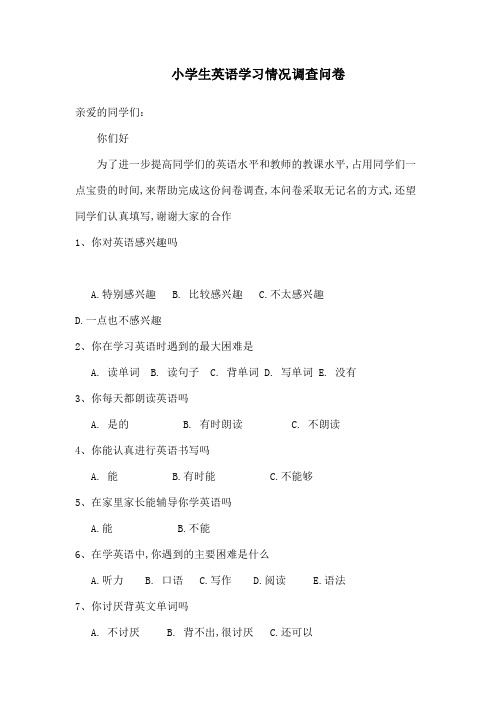
小学生英语学习情况调查问卷亲爱的同学们:你们好为了进一步提高同学们的英语水平和教师的教课水平,占用同学们一点宝贵的时间,来帮助完成这份问卷调查,本问卷采取无记名的方式,还望同学们认真填写,谢谢大家的合作1、你对英语感兴趣吗A.特别感兴趣B. 比较感兴趣C.不太感兴趣D.一点也不感兴趣2、你在学习英语时遇到的最大困难是A. 读单词B. 读句子C. 背单词D. 写单词E. 没有3、你每天都朗读英语吗A. 是的B. 有时朗读C. 不朗读4、你能认真进行英语书写吗A. 能B.有时能C.不能够5、在家里家长能辅导你学英语吗A.能B.不能6、在学英语中,你遇到的主要困难是什么A.听力B. 口语C.写作D.阅读E.语法7、你讨厌背英文单词吗A. 不讨厌B. 背不出,很讨厌C.还可以8、上英语课时,你会忘记带英语书吗A.不会B. 有时候会忘C.经常忘9、在学习中,你以什么方式记忆最有效A.活学活用B.死记硬背C.只看不写D.只写不看E.多听录音F.边读边写G.其他方式10、现在你学习英语感觉A.容易B.难C.不想学问卷到此结束,再次感谢同学们的积极配合小学英语学习情况调查分析报告这次调查的对象是小学三、四年级学生,共有学生64人,调查了64人,有效62份.从调查所得的数据看,我校小学三、四年级英语教学呈现以下特点:1、一部分学生养成了良好的英语学习习惯.学习任何一门学科,都离不开学生积极主动地学习,离不开良好的学习习惯.从调查的结果看,在小学英语学习上,学生已经具备了学好英语的基本要素.调查数据如下:从以上数据可以看出,能够坚持每天都朗读英语的有20人,占30%.从抽样调查看,全班同学大多数都能认真书写英语,这是学习英语的重要态度.大部分学生都能时刻记着把英语教材和其他教材一起带到学校,这也是英语学习的重要态度.2、英语学习出现了良好的发展势头.正因为有了良好的学习习惯,全校学生现在对英语学习感觉很有兴趣,在学习英语上出现了良好的发展势头:有40.7%的人表示目前学习英语没有困难,26%的人认为背单词有一定的难度要知道,现在的学生对背英语单词最感到头疼.从数据看,只有4个学生讨厌学习英语,绝大多数都很乐意学习英语.正是如此,66.7%的学生感觉学习英语很容易.在“你喜欢什么样的英语课”的调查中,20%的同学喜欢“老师多讲解”,60%的同学希望“多做点课堂活动”.这也提醒我们的教师,要“把地道的英语课堂还给学生”.通过调查问卷显示的问题,找出自己的不足,如培养学生学习兴趣与严格管理相结合,喜欢英语,更要重视英语.自己在这方面需要下功夫.课堂活动单一,没有调动起学生的积极性;没有关注到全体学生,有的学生成绩在班里还可以,但心理上对英语有排斥心理,教师没有发现这些同学的心理变化,未能积极与这些同学进行沟通,这些都是需要以后改进的地方.学生问卷调查分析本次小学生英语学习情况的调查问卷,主要是为有针对性地加强小学英语教学,提高小学英语教学的有效性,有针对性地帮助学生解决小学英语学习中的困难,专门设计此调查问卷,根据调查的结果反馈如下:1、学生对英语喜爱的都是英语学习上较优秀的学生,学困生都不太喜欢本学科.2、多数学生都不太愿意用英语和别人进行交流,并且家长经常辅导的也很少.3、学生在学习英语的过程中,学习兴趣发生了变化.不少学生都是由开始的很感兴趣到最后的不感兴趣,学生对英语的学习意愿也随之降低.4、多数学生不能做到主动预习或复习英语.大部分学生对自己学习小学英语的兴趣和效果不满意以上反馈的信息充分暴露出了学生在英语学习中存在的问题,我们要根据以上问题有针对性的帮助学生解决小学英语学习中存在的问题.。
小学英语课堂教学问卷调查

小学英语课堂教学生活化问卷调查(学生卷)Q1:性别
○ 男
○ 女
Q2:你喜欢你的英语老师吗?
○ 喜欢
○ 不喜欢
Q3:你喜欢你的英语课吗?
○ 喜欢
○ 不喜欢
Q4:你喜欢你的英语老师上课的方式吗?
○ 喜欢
○ 不喜欢
Q5:你的英语课堂有些什么环节?
□ 知识讲授
□ 游戏
□ 活动
□ 情景对话
□ 背诵
Q6:你的英语老师上课多样化教学手段有哪些?
□ 多媒体
□ 电子白板
□ 图片
□ 道具
□ 动画
Q7:教师在设计课外作业有做到:
□ 趣味性
□ 实用性
□ 创造性
□ 艺术性
Q8:你们英语老师上课注重环节的主次依次为:
课文
游戏
情景演练
学生实践
单词记忆
Q9:你给你的英语老师英语课堂教学生活化打多少分?
课堂教学★★★★★
Q10:你给你们自己英语学习效果打多少分?
学习效果★★★★★
Q11:英语课堂教学中生活化体现的好吗
好不好
知识讲授○ ○
趣味游戏○ ○
情景模拟○ ○
学生实践○ ○
Q12:你们学校英语教学情况反映:
好差程度高低层次
学校英语教学配备★★★★★★★★★★运用实物、图片、简笔画、教具等巧设情景★★★★★★★★★★学生自主学习、合作学习、探究学习模式★★★★★★★★★★Q13:你最喜欢英语老师课堂教学中的什么优点?
____________。
小学英语情趣教学调查问卷
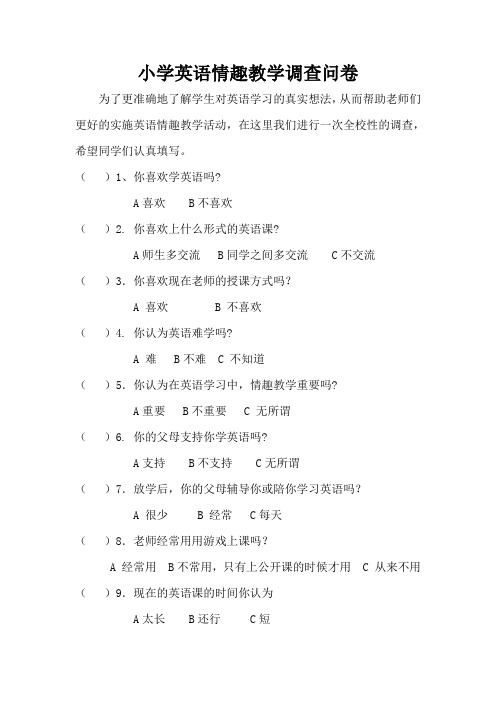
小学英语情趣教学调查问卷
为了更准确地了解学生对英语学习的真实想法,从而帮助老师们更好的实施英语情趣教学活动,在这里我们进行一次全校性的调查,希望同学们认真填写。
()1、你喜欢学英语吗?
A喜欢 B不喜欢
()2. 你喜欢上什么形式的英语课?
A师生多交流 B同学之间多交流 C不交流
()3.你喜欢现在老师的授课方式吗?
A 喜欢
B 不喜欢
()4. 你认为英语难学吗?
A 难 B不难 C 不知道
()5.你认为在英语学习中,情趣教学重要吗?
A重要 B不重要 C 无所谓
()6. 你的父母支持你学英语吗?
A支持 B不支持 C无所谓
()7.放学后,你的父母辅导你或陪你学习英语吗?
A 很少
B 经常 C每天
()8.老师经常用用游戏上课吗?
A 经常用 B不常用,只有上公开课的时候才用 C 从来不用()9.现在的英语课的时间你认为
A太长 B还行 C短
小学英语情趣教学调查问卷
路井镇中心小学
2014年11月。
小学英语问卷调查表(1)
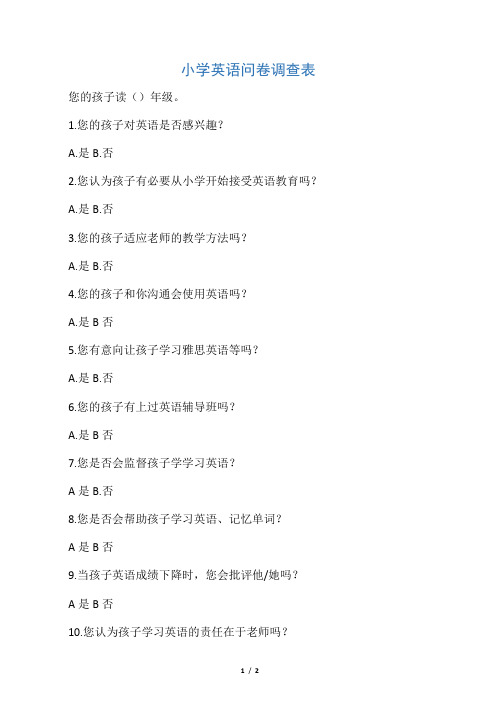
小学英语问卷调查表您的孩子读()年级。
1.您的孩子对英语是否感兴趣?
A.是
B.否
2.您认为孩子有必要从小学开始接受英语教育吗?
A.是
B.否
3.您的孩子适应老师的教学方法吗?
A.是
B.否
4.您的孩子和你沟通会使用英语吗?
A.是B否
5.您有意向让孩子学习雅思英语等吗?
A.是
B.否
6.您的孩子有上过英语辅导班吗?
A.是B否
7.您是否会监督孩子学学习英语?
A是B.否
8.您是否会帮助孩子学习英语、记忆单词?
A是B否
9.当孩子英语成绩下降时,您会批评他/她吗?
A是B否
10.您认为孩子学习英语的责任在于老师吗?
A是B否
11.您的孩子对自己的英语老师是否满意?
A是B否
12.您认为提高孩子的英语学习成绩的关键在于?(可多选)
A老师的教学B孩子自身的兴趣C学习量的多少
D优秀的教学设备E优良的语言环境F孩子的学习态度
13.您对于老师的教学方法或者对于学校有什么意见或者建议? ________________________________________________________ 谢谢您配合我们的问卷调查活动。
- 1、下载文档前请自行甄别文档内容的完整性,平台不提供额外的编辑、内容补充、找答案等附加服务。
- 2、"仅部分预览"的文档,不可在线预览部分如存在完整性等问题,可反馈申请退款(可完整预览的文档不适用该条件!)。
- 3、如文档侵犯您的权益,请联系客服反馈,我们会尽快为您处理(人工客服工作时间:9:00-18:30)。
小学英语情境教学现状调查问卷(教师用)
亲爱的老师:
您好!为了比较全面地了解您对小学情境英语教学的理解及实施情况,恳请
您填答以下的问题。
本问卷作为我硕士毕业论文的研究之用,您的宝贵意见对我的研究非常重要。
问卷无需署名,答案的选择对您无任何影响,不会对外透露您的任何信息,请您放心回答。
非常感谢!
祝您工作顺利天天开心
一、基本信息
1、您所在学校的类型:
(1)重点学校(2)非重点学校
2、您所在学位的位置:
(l)城市(2)城乡结合部(3)农村
3、您目前任教的年级:
(1)三年级(2)四年级(3)五年级(4)六年级
4、您的学历层次:
(1)大专及以下(2)本科(3)硕士研究生及以上(4)其他
5、您的专业背景:
(l)英语或英语教育专业(2)其他专业
6、您的职称:
(l)小学二级(2)小学一级(3)高级(4)其他
7、您的年龄为:
(l)20一25岁(2)36一30岁(3)31一35岁(4)36一40岁(5)40岁以上
8、您的教龄为
(1)l一5年(2)6一10年(3)11一15年(4)16一20年(5)20年以上
9、您所在班级的班额是:
(l)30人以下(2)30—45人(3)46一60人(4)60人以上
10、您参与教研活动的频率是:
(1)经常(2)偶尔(3)有就参加(4)不经常(5)从未
11、您是否主动阅读一些关于教学理论和教学法方面的书籍或者刊物?
(l)是(2)否
12、您是否参加过有关“情境教学”的相关培训或学习?
(l)是(2)否
二、问卷调查(将适合的选项填在括号内)
1、您了解英语情境教学吗?
A、非常了解
B、比较了解
C、不太了解
D、不知道
2、您认为有必要进行英语情境教学吗?
A很有必要B、比较需要C、一般D、没必要
3、您在备课的时候会考虑通过创设一定情境来进行教学吗?
一直很重视B、有时C、偶尔D、从来没有
4、您在课堂中会精心创设各种丰富的教学情境吗?
A、经常
B、有时
C、偶尔
D、从来没有
5.您认为现有教材提供的情境实用性怎样?
A、非常好
B、较满意
C、一般
D、还需要改进
6、除了英语教材上的素材,您还会搜集其它一些资料作为情境创设的素材吗
A、经常
B、有时
C、偶尔
D、从来没有
7、您分析过所用情境素材的教学价值吗?
A、每次都有
B、有时
C、偶尔
D、从来没有
8、您会在课堂上讲述西方国家的风俗习惯、生活方式等相关文化吗?
A、经常讲
B、有时讲
C、偶尔讲
D、从来没有
9、您在课堂中有机会给同学们展示一些课外原版的语言材料吗(如录像、
录音等)?
A、经常定期安排
B、有时会安排
C、偶尔安排
D、从不安排
10、您会在课余时带领学生将教室布置成充满英语学习氛围吗?
A、经常
B、有时
C、偶尔
D、从不
11、在课堂中您利用教学挂图、实物、简笔画或自制教具来创设切合教学内容的课堂情境吗? 经常B、有时C、偶尔D、从不
12、在课堂中您用多媒体设备、录音机、语音室、等现代化教学手段吗?
A、经常
B、有时
C、偶尔
D、从不
13、课上您让孩子们听、唱英文歌曲或童谣吗?
A、经常
B、有时
C、偶尔
D、从不
14、在教学中您会结合学生的学习情况创设生活情境吗?
A、经常
B、有时
C、偶尔
D、从不
15、上课过程中您会经常利用肢体语言(如丰富的表情、做手势、做动作、
唱歌、跳舞等)创设情境启发学生思考吗?
A、经常
B、有时
C、偶尔
D、从不
16、在课堂中您会利用组织切合教学内容的游戏和小组竞赛的方式激励学
生学习吗?
A、经常
B、有时
C、偶尔
D、从不
17、在课上您会让学生模拟教材情境或自创生活情境分角色来扮演吗?
A、经常
B、有时
C、偶尔
D、从不
18在布置作业时,您会布置学生预习下一课,并准备和下节课有关的实
物资料(实物、图片、报纸等)吗?
A、经常
B、有时
C、偶尔
D、从不
19、在布置作业时,您会布置学生分小组完成手抄报、表演对话或者编演
小短剧吗?
A、经常
B、有时
C、偶尔
D、从不
20、对于课堂上创设的各种教学情境,您认为学生感兴趣吗?
A、很感兴趣
B、较有兴趣
C、兴趣一般
D、一点也不感兴趣
21、通过在课堂上创设一些教学情境,学生的求知欲增强了么?
A、明显增强
B、较有改善
C、变化不大
D、没有变化
22通过在课堂上创设一些教学情境,学生的口语能力提高了么?
A、明显提高
B、较有改善
C、变化不大
D、没有变化
23.在课堂中使用情境教学法时,学生的参与度如何?
A、很高
B、较高
C、一般
D、低
24、日常教学中对学生口语进行测试的情况
A、经常
B、有时
C、偶尔
D、从不
25、期中、期末考试中口语成绩所占比例
A、每次有
B、有时
C、很少
D、基本没
26、在教学中对学生评价时利用各种激励性语言的情况(great、well done等)
A、经常
B、有时
C、偶尔
D、从不
27、在课堂评价学生学习时,您充分利用丰富的肢体语言(如微笑、反复点头、露出赞赏的样子等)去评价学生吗?
A、经常
B、有时
C、偶尔
D、没意识
28、在课堂教学中,您认为使用情境教学所获得的效果如何?
A、很好
B、较好
C、一般
D、不好
29.影响你在听说教学中进行情境创设的主要因素是(多项选择)
A、教学时间问题
B、认为没有必要
C、教学硬件不允许
D、考试与情境关联不大
E、其他
30、您认为创设教学情境的难点是(多项选择):
A、考试压力大
B、学生的素质不均衡,两级分化严重,同一题材不一定符合所有学生的实际情况
C、课程安排较紧,内容多,没有充足的时间
D、要求教师要有扎实的专业知识、广泛的涉猎和较强的信息处理能力
E、教师任务重,没精力做相关准备
F、其他。
